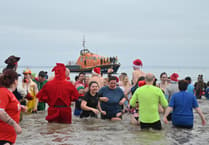With families enjoying the long weekend and school holidays by visiting the Pembrokeshire coast, the RNLI is urging people to go to a lifeguarded beach where possible and remember their lifesaving Float to Live advice. Weather and surf forecasts are showing a strong likelihood of large and potentially dangerous surf conditions from Monday, peaking that evening and into Tuesday.
The biggest surf is likely to be on southerly and westerly facing beaches and coastlines.
Chris Cousens, RNLI Water Safety Lead said: “We want people to enjoy the bank holiday and stay safe, and with this unusually big surf forecast for this time of year likely to peak later in the bank holiday weekend and early next week, it’s important for people to be aware so they can keep themselves and their families safe.
“Big surf means greater risk from rip currents and the swell also coincides with spring tides – which means more powerful tidal water movement at greater speed.
“The forecast is changeable, so things might look different over the next couple of days. But we do know that with the current forecast for bigger waves building and arriving towards the end and the day after the August bank holiday weekend, beaches are likely to be busy with holidaymakers and locals.
“Some places could see bigger waves building through the weekend too.
“We always advise people to visit a lifeguarded beach where possible – but we also appreciate people will be out on the coast where lifeguards are not present. Rip currents are powerful channels of water that become more powerful in larger surf. They are also found around river mouths, estuaries and man-made structures like piers and groynes.
“Our rip current advice is the same whether you are at a lifeguarded beach or not. If you find yourself caught in a rip current don’t fight against it or you’ll get exhausted. If you can stand, wade don’t swim back to shore, or swim parallel to the beach until you’re free of the current, then return to the beach.
“Alternatively, if you can’t do either of those or are becoming exhausted – Float to Live to preserve your energy and then wave and shout for help.”
Earlier this month RNLI lifeguards in south-west Wales rescued 46 people in less than a week at three of Pembrokeshire’s most popular beaches.
On a single day (Friday, August 8), RNLI lifeguards patrolling at Freshwater West Beach rescued 16 people and assisted more than 40 between 10am-6pm.
All those rescued were in difficulty due to rip currents. Those helped by the lifeguards were a combination of bodyboarders, swimmers and surfers. On duty lifeguards used their Rescue Watercraft (RWC) and rescue boards to help and assist the individuals, who were all safely returned to shore.
Over the weekend of 9-10 August, lifeguards patrolling at Newgale Beach rescued six people and assisted a further seven people from rip currents. Most of the casualties were rescued after entering the water outside of the flagged lifeguard patrol areas, showing the importance of always swimming between the flags.
On Monday 11 August, RNLI lifeguards patrolling at Tenby Castle Beach rescued six people and assisted two people using inflatables who were in difficulty caught in rip currents. The groups were using inflatables and stand-up-paddleboards, which began to be swept behind St Catherine’s Island by the strong currents. Four of the five were rescued using a rescue board and the two others were escorted back to shore by the lifeguards.
Tai Jackson, RNLI Lifeguard Supervisor for South Pembrokeshire said: “This busy period during the summer holidays shows the importance of choosing a lifeguarded beach. We position the flags in the safest areas of the beach, but conditions are ever changing and flash rip currents can appear unexpectedly.
“The majority of our rescues were to people caught in rip currents or using inflatables. Inflatables can easily be blown out to sea by an offshore wind and pulled out to sea by rip currents. They are not designed to be used in the sea and we advise only using them in a swimming pool.”
On Tuesday 12 August, RNLI lifeguards at Newgale Beach rescued 14 people and assisted more than 30 people. At Freshwater West, two more people were rescued. These were a combination of swimmers, bodyboarders and paddleboarders, all of whom got into difficulty in rip currents. All were returned safely to shore and checked over by the lifeguards.
On Wednesday 13 August, RNLI lifeguards patrolling at Newgale spotted 3 bodyboarders in difficulty in a rip current. One of the group managed to catch a wave in, but the two others were rescued by a lifeguard using a rescue tube.
On Friday 15 August at Newgale, a patrolling lifeguard spotted two young children in the sea outside of the red and yellow flags. One swimming and one on a bodyboard, both were stuck in a rip current and visibly struggling. The lifeguard immediately made his way out on a rescue board, as he approached, he could see that they were both going under water. They were both helped onto the rescue board and escorted back to shore. The parents had been unaware that the children were in difficulty.
George Morgan, Senior Lifeguard in North Pembrokeshire said: “When we have bigger swell and stronger winds, we usually see a spike in rip current rescues. We use red flags and windbreaks to mark rip currents.
“So if you see a red flag, we have deemed that area of the beach as unsafe and strongly advise against entering the water. Sometimes we may red flag a whole beach if we deem the conditions too dangerous. Please come and chat to us on the beach if you have any questions.
“A number of our rescues have been to unsupervised children. Please always keep an eye on your children and don’t let them in the sea without supervision. And if you lose your child at the beach – alert the lifeguards as soon as possible.”
RNLI lifeguards are patrolling every day from 10am-6pm at beaches across the UK. If you see anyone in difficulty at the beach, tell the lifeguards or call 999 and ask for the Coastguard.
You can find your nearest lifeguarded beach at: Find Your Nearest RNLI Lifeguarded Beaches.
RNLI Float to Live advice:
- Tilt your head back, submerging your ears
- Relax and control your breathing
- Move your hands and legs around to help you stay afloat
- Your legs may sink, that’s ok – we all float differently
- Practice swimming at a supervised location like a swimming pool.
RNLI advice if caught in a rip current:
- Don’t try to swim against it or you’ll get exhausted
- If you can stand, wade don’t swim
- If you can, swim parallel to the shore until free of the rip and then head for shore
- Always raise your hand and shout for help
- If your struggling, conserve your energy and Float to Live.





Comments
This article has no comments yet. Be the first to leave a comment.